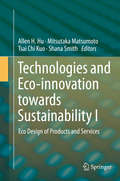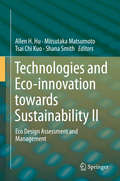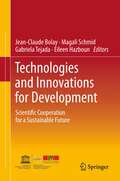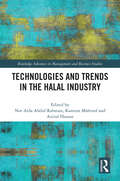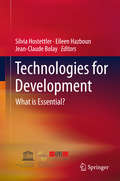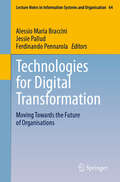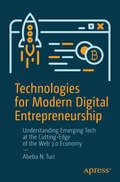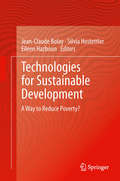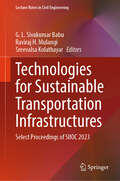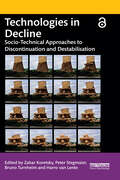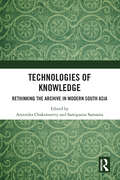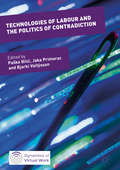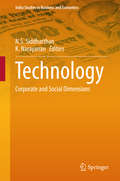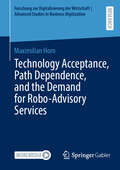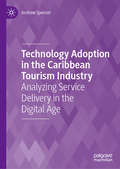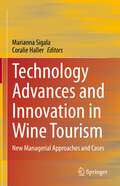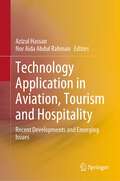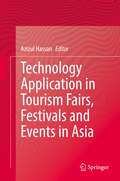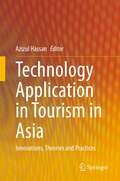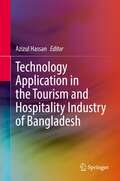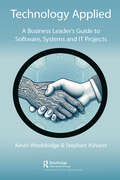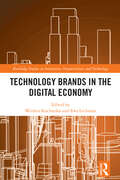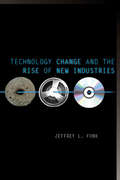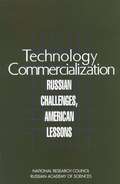- Table View
- List View
Technologies and Eco-innovation towards Sustainability I: Eco Design of Products and Services
by Mitsutaka Matsumoto Allen H. Hu Tsai Chi Kuo Shana SmithThis 2-volume book covers the state-of-the-art of the research and practices on eco-design. It covers the latest topics in the field: e.g. global eco-design management, big data in eco-design, social perspectives in eco-design; as well as emphasizing the developments in emerging economies such as Asian countries. Eco-design of products and product-related services are indispensable to realize the circular economy and to increase resource efficiencies of our society. Eco-design practices are necessary both in developed countries and developing countries. The book chapters are contributed by the worldwide authors, especially authors from East Asian countries, European countries, and Southeast Asian countries, and contains selected presentations at the EcoDesign2017 symposium (10th International Symposium on Environmentally Conscious Design and Inverse Manufacturing). The first volume highlights products and services, the chapters include the product life cycle design and business strategy, technologies for the future and sustainability, as well as social perspectives in eco-design.
Technologies and Eco-innovation towards Sustainability II: Eco Design Assessment and Management
by Mitsutaka Matsumoto Allen H. Hu Tsai Chi Kuo Shana SmithThis 2-volume book covers the state-of-the-art of the research and practices on eco-design. It covers the latest topics in the field: e.g. global eco-design management, big data in eco-design, social perspectives in eco-design; as well as emphasizing the developments in emerging economies such as Asian countries. Eco-design of products and product-related services are indispensable to realize the circular economy and to increase resource efficiencies of our society. Eco-design practices are necessary both in developed countries and developing countries. The book chapters are contributed by the worldwide authors, especially authors from East Asian countries, European countries, and Southeast Asian countries, and contains selected presentations at the EcoDesign2017 symposium (10th International Symposium on Environmentally Conscious Design and Inverse Manufacturing).The second volume focus on assessment and management, including topics such as sustainable manufacturing and End of Life (EOL) management, sustainability assessment, policy and regulations and Incentives for eco-design.
Technologies and Innovations for Development
by Alexandre Schmid Eileen Hazboun Jean-Claude Bolay Gabriela TejadaTechnological innovation - combined with scientific research - has always constituted a driving force of transformation in our societies. At the same time, it is no longer simply possible to transfer technologies from the North to the South; it is also essential to consider technical innovations that are adapted to the social, environmental, cultural and economic conditions of receiving countries, and which can be appropriated by their potential users and as such prove to be real technologies for fostering development. The first International Scientific Conference on the topic organized by the UNESCO Chair Technologies for Development at the Ecole Polytechnique Fédérale de Lausanne in 2010 focused on its four priority sectors: Technologies for Sustainable Development of Habitat and Cities, ICTs for the Environment, Science and Technology for Disaster Risk Reduction, and Technologies for the Production of Sustainable Energy. This volume reflects the main outcomes of the conference and provides some significant orientation and success criteria for the effective implementation and use of innovative technologies, their aims, their particular applications in the context of developing countries, their accessibility for users, and their appropriation by producers and stakeholders in the field of development both in the North and South, thus ensuring their sustainability. This kind of scientific cooperation also highlights the added values for northern researchers in sharing their knowledge and know-how, leading to a real win-win partnership. The authors gathered within this book include representatives from academic and research institutions and other organizations from diverse countries and offer a significant synergy of competences, approaches and disciplines.
Technologies and Trends in the Halal Industry (ISSN)
by Azizul Hassan Abdul Rahman, Nor Aida Kamran MahroofWith recent technological developments, touted also as Industry 4.0, numerous articles published over the years have emphasized the need to investigate the role of technology across all sectors including the halal industry. This book provides a greater understanding of the technologies, trends, and debates associated with the halal industry from different sectors such as food, logistics, pharmaceutical, tourism, medical, cosmetic, and the retail sector.The book adds substantial discussion to the issues and trends of technology applications in the halal industry as well as the theories underpinning halal technology studies. It is in four sections: an overview of the halal industry, selected theories, technology, and recent issues. The contributors explore how technology has evolved and been applied in industry, and also look at how Industry 4.0 technologies like blockchain, Internet of Things (IoT), automation, machine learning, and augmented reality are being integrated in the halal supply chain process. Written by well- regarded scholars and international academics from Africa, Europe, Middle East, and Asia, this book provides expert contributions from research, regulatory, and industry perspectives.This book will interest upper level students, scholars, academics, and practitioners in the various discipline of tourism and travel, hospitality, food studies, marketing, pharmaceutical and medical, logistics, management, Islamic studies and information technology in the halal industry.
Technologies and Trends in the Halal Industry (Routledge Advances in Management and Business Studies)
by Azizul Hassan Abdul Rahman, Nor Aida Kamran MahroofWith recent technological developments, touted also as Industry 4.0, numerous articles published over the years have emphasized the need to investigate the role of technology across all sectors including the halal industry. This book provides a greater understanding of the technologies, trends, and debates associated with the halal industry from different sectors such as food, logistics, pharmaceutical, tourism, medical, cosmetic, and the retail sector. The book adds substantial discussion to the issues and trends of technology applications in the halal industry as well as the theories underpinning halal technology studies. It is in four sections: an overview of the halal industry, selected theories, technology, and recent issues. The contributors explore how technology has evolved and been applied in industry, and also look at how Industry 4.0 technologies like blockchain, Internet of Things (IoT), automation, machine learning, and augmented reality are being integrated in the halal supply chain process. Written by well- regarded scholars and international academics from Africa, Europe, Middle East, and Asia, this book provides expert contributions from research, regulatory, and industry perspectives. This book will interest upper level students, scholars, academics, and practitioners in the various discipline of tourism and travel, hospitality, food studies, marketing, pharmaceutical and medical, logistics, management, Islamic studies and information technology in the halal industry.
Technologies for Development
by Eileen Hazboun Jean-Claude Bolay Silvia HostettlerThe book presents case studies from Africa, Asia and Latin America addressing global development issues in the fields of health, energy, ICT and urbanism in an interdisciplinary way. The book illustrates key issues at the interface of technology, human, social, and economic development. Bringing together the best papers of the 2014 EPFL-UNESCO Conference on Technologies for Development, this book explores innovative technologies in the global South. It will be a valuable reference for researchers from engineering, natural sciences, information management, quantitative social sciences, and business faculties, as well as for development practitioners and policy makers. It shows the development potential of technologies, and discusses successful processes to develop and deploy them, as well how to evaluate their impact. The introduction to the book begins with a reflection on key issues regarding technologies for development. The following four sections focus on; (i) Innovative Technologies for Development, (ii) Open Source-Open Access-Open Innovation, (iii) Medical Technologies for the Global South, and (iv) Impact Assessment of Technologies for Development. Individual chapters explore issues such as a need for solid standards for newly developed technologies, how to successfully up-scale technology to a larger region, and how to involve private industry in the development of a technology.
Technologies for Digital Transformation: Moving Towards the Future of Organisations (Lecture Notes in Information Systems and Organisation #64)
by Ferdinando Pennarola Alessio Maria Braccini Jessie PalludDigital technologies can have a profound impact on modern organisations, changing the way they operate, communicate, cooperate, and deliver value to stakeholders. This book gathers the selected and revised best papers presented at the annual conference of the Italian Chapter of AIS, which took place in Catanzaro in October 2022. It offers a comprehensive overview of the impacts of emerging digital technologies, such as AI, machine learning, blockchain, and Industry 4.0, on organisations and industries. In this book, these digital technologies are explored in relation to the digital transformation process for business organisations and industries. It investigates how emerging technologies influence the digital transformation of diverse business organisations, pointing out research trajectories, implications, opportunities, and challenges. Covering a wide range of topics related to digital transformation, it offers valuable insights into the latest research on the opportunities and challenges that accompany emerging digital technologies.
Technologies for Modern Digital Entrepreneurship: Understanding Emerging Tech at the Cutting-Edge of the Web 3.0 Economy
by Abeba N. TuriEmerging technologies offer a plethora of unprecedented opportunities for entrepreneurs in the digital space. Understanding this evolution is essential for web-based business models to succeed. The Web 3.0 economy is here, and this book has arrived to serve as your guide.Technologies for Modern Digital Entrepreneurship is an in-depth look at the new developments of the digital economic system. Cryptocurrencies, Central Bank Digital Currencies, and Stable Coins are explained through timely case studies, as well as innovations in crowdfunding, educational marketplaces, and scalability in blockchain-based transactions. Author Dr. Abeba N. Turi expertly navigates the industry transition from platform-based centralized Web 2.0 economy to the distributed network economy. Turi additionally explores trust and reputation as currency in the digital economy and allays common fears in digital entrepreneurship such as mistrust by investors and intellectual property loss.Avoid falling behind your competitors in the Wild West that is modern digital entrepreneurship. Whether you are a business leader, a technology enthusiast, or a researcher in the field, Technologies for Modern Digital Entrepreneurship gives you the advantage of insightful knowledge using real data and meaningful examples. Amid global regulatory changes and the ever-shifting methods of digital entrepreneurship, our modern era demands this book. What You Will Learn Discover new trends in the digital economic systemComprehend the crowd-based digital business modelsAnalyze the distributed information network economyUnderstand the workings of the currency system under the Web 3.0 economy, including Cryptocurrencies, Central Bank Digital Currencies, and Stable CoinsWho This Book Is ForTechnology enthusiasts, tech and interdisciplinary students, digital business leaders, and researchers in the field
Technologies for Sustainable Development: A Way to Reduce Poverty?
by Eileen Hazboun Jean-Claude Bolay Silvia HostettlerWhilst scientific research can be crucial in guiding innovation and development throughout the world, it can be too detached from real world applications, particularly in developing and emerging countries. Technologies for Sustainable Development brings together the best 20 papers from the 2012 Conference of the EPFL-UNESCO Chair in Technologies for Development with the aim to explore and discuss ways to link scientific research with development practices to assist practitioners and reply directly to social needs. In order for technologies to be adopted it is not sufficient that they are low cost and affordable but also socially, culturally and environmentally accepted by the intended users. Technologies for Sustainable Development aims to explore and answer the following three questions: * What is an appropriate technology? * How can we ensure a sustainable, integrated development? * What are the conditions for co-creation and transfer of such technologies? Focusing on the importance of improving working relationships between stakeholders; researchers and decision-makers; between scientists and industrial sectors; between academics and the population; Technologies for Sustainable Development opens a dialogue necessary to create and implement the best solutions adapted to social demands.
Technologies for Sustainable Transportation Infrastructures: Select Proceedings of SIIOC 2023 (Lecture Notes in Civil Engineering #529)
by G. L. Sivakumar Babu Sreevalsa Kolathayar Raviraj H. MulangiThis book presents select proceedings of the International Conference on Sustainable Infrastructure: Innovations, Challenges, and Opportunities 2023 (SIIOC 2023). The topics covered include road user safety and traffic mitigation for sustainable highways, transportation geotechnics, design and construction approaches for green highways, water and wastewater treatment, sustainable cities, and challenges in the management of water resources. This book serves as a resource material for budding researchers and industry professionals interested in developing solutions for sustainable infrastructure.
Technologies in Decline: Socio-Technical Approaches to Discontinuation and Destabilisation
by Harro Van Lente Bruno Turnheim Peter Stegmaier Zahar KoretskyThe central questions of this book are how technologies decline, how societies deal with technologies in decline, and how governance may be explicitly oriented towards parting with ‘undesirable’ technology. Surprisingly, these questions are fairly novel. Thus far, the dominant interest in historical, economic, sociological and political studies of technology has been to understand how novelty emerges, how innovation can open up new opportunities and how such processes may be supported. This innovation bias reflects how in the last centuries modern societies have embraced technology as a vehicle of progress. It is timely, however, to broaden the social study of technology and society: next to considering the rise of technologies, their fall should be addressed, too. Dealing with technologies in decline is an important challenge or our times, as socio-technical systems are increasingly part of the problems of climate change, biodiversity loss, social inequalities and geo-political tensions. This volume presents empirical studies of technologies in decline, as well as conceptual clarifications and theoretical deepening. Technologies in Decline presents an emerging research agenda for the study of technological decline, emphasising the need for a plurality of perspectives. Given that destabilisation and discontinuation are seen as a way to accelerate sustainability transitions, this book will be of interest to academics, students and policy makers researching and working in the areas of sustainability science and policy, economic geography, innovation studies, and science and technology studies.
Technologies of Knowledge: Rethinking the Archive in Modern South Asia
by Samiparna Samanta Aryendra ChakravarttyThis book traces the role of technology in shaping, curating, disseminating, and archiving knowledge and life in South Asia. It focuses on empirical studies of transformative social processes unleashed by technological intervention in colonial and postcolonial contexts, which have changed our everyday lives and created new sites of domination and resistance, and new archives of history.Unraveling technology as an indicator of South Asia’s encounter with modernity, the chapters in the volume interrogate how technology was witnessed in the production of culture, historicizing and preserving the past, and establishing claims to heritage and history. In addition to examining the critical role of creative and commercial networks in establishing communities, the volume also scans the significant contribution of technology as a mechanism of social control. It highlights the pervasive nature of discourse that continues to assert its legitimacy, despite significant challenges to its structures of dominance, be it in the case of Bengali women or imperial dreams of curating a rapidly eroding past. In doing so, the volume emphasizes the discursive thoughts and practices that permeate the functioning of an empire and a postcolonial nation-state through narratives of resilience, appropriation, silences, and dissent.This volume will be of great interest to scholars and researchers of science and technology studies, digital humanities, South Asian studies, modern history, colonialism, and post-independence India.
Technologies of Labour and the Politics of Contradiction (Dynamics Of Virtual Work Ser.)
by Paško Bilić Jaka Primorac Bjarki ValtýssonThis book is situated in the nexus between technology, labour and politics. It focuses on contradictions as heuristic devices that uncover struggles, frictions and ambiguities of digitalization in work and labour environments. Topics include contradictions in automation, internet platforms, digital practices, creative industries, communication industries, human interaction, democratic participation and regulation. Three cross-cutting themes can be identified within the diverse chapters represented in the book. First, many authors argue that labour and economic valorisation occur outside of the traditional concept of working space and time. Second, digital technology is not fixed under capital. It is malleable and mouldable. Third, many political tensions are occurring without organized awareness or dissent. The book will, therefore, be of interest to researchers and students in the fields of sociology of work, media studies, cultural studies, gender studies, science and technology studies and Critical Theory as well as to trade-unionists and policy makers.
Technology
by K. Narayanan N. S. SiddharthanThis volume deals with the role and impact of technology on the economy and society. The papers on corporate dimensions address the impact of patents, determinants of innovative activities, differential behaviour of multinationals, industrial groups and other firms with regard to innovations and technology. In contrast, the papers on social dimensions chiefly deal with the role of technology in reducing inequality. The majority of the papers employ econometric techniques and other statistical methods, and many are based on primary data. The studies emphasise the importance of innovations (especially patents) and human capital in influencing productivity across Indian states, the significance of patenting in determining the efficiency of firms, the role of business groups in promoting innovations, differences in the technological characteristics of multinational and domestic firms, and how mergers and acquisitions can promote R&D. The papers on social dimensions analyse how innovative activities can shape employment, the impact of technology on poverty, the socioeconomic characteristics of mobile phone ownerships, use of information and communications technologies at educational institutions, and the influence of Synchronous Technologies in reducing access to teaching programmes. The studies show that those Indian states that have invested in human capital and technology experienced higher labour productivity. Further, the studies establish a positive correlation between R&D spending and employment. Lastly, they demonstrate that the adoption of agriculture-related technologies can have a significant impact on rural poverty and consumption expenditures.
Technology Acceptance, Path Dependence, and the Demand for Robo-Advisory Services (Forschung zur Digitalisierung der Wirtschaft | Advanced Studies in Business Digitization)
by Maximilian HornThis book explores the effects of the previously ignored factors of path dependence and product features on technology acceptance with a focus on robo-advice. A newly developed model introduces path dependence to technology acceptance research allowing to explain previously unaccountable effects. An empirical test of the model using data from Germany and the USA elicits that path dependence influences the attitudes towards and demand for robo-advice. A process consisting of a market survey, a choice-based conjoint analysis, and a test in a technology acceptance model allows the structured investigation of the effects of product features on the demand for robo-advice. The results show that selected product features have effects on the demand for robo-advice and that it is essential to establish these effects empirically.
Technology Adoption in the Caribbean Tourism Industry: Analyzing Service Delivery in the Digital Age
by Andrew SpencerThis book investigates the adoption of Information and Communication Technologies (ICTs) in Caribbean travel firms, particularly for sales and marketing purposes. By examining the decision-making process in tourism companies deciding whether to become more dependent on digital capabilities and artificial intelligence, this text seeks to understand the role of strategy and resources in technology adoption. Further, the author assesses the role of factors both external (such as culture) and internal (such as leadership) in this strategic process. Economies in the Caribbean are reliant on tourism to bring prosperity to the region, and with the onset of the COVID-19 pandemic, the industry is being forced to transform the way it operates. With implications for those studying organizational behavior as well as strategic and tourism management, this study analyzes rapid change in this pivotal industry.
Technology Advances and Innovation in Wine Tourism: New Managerial Approaches and Cases
by Marianna Sigala Coralie HallerThis book consolidates under one roof the latest research investigating the various technological advances and new managerial approaches driving innovation within wine tourism. Competition in wine tourism intensifies at a global scale, while wine tourism demand continuously evolves, diversifies and becomes more sophisticated. The book highlights that innovation and technology exploitation have become not only a way to differentiate but also a survival necessity for wine tourism operators and wine destinations alike.This book includes cutting edge research about the latest technological developments and advances that revolutionise the wine tourism sector and transform the way wine tourism experiences are designed and delivered. In addition, the book includes case studies and research findings showing how wine tourism operators and destinations can nurture, support and implement innovation at various levels, including the experience, the process, the business model and/or the ecosystem level.
Technology Application in Aviation, Tourism and Hospitality: Recent Developments and Emerging Issues
by Azizul Hassan Nor Aida Abdul RahmanThis book covers multiple areas such as technology and the type of application in aviation, tourism and hospitality with looking at current and future technology application, as well as in a rural tourism perspective. The strength of this book comes from the authors themselves coming from multiple higher institutions in Malaysia and Indonesia as these two countries are the top two countries in Southeast Asia with the world's most popular tourist destinations and for a reason: a tropical climate, rich culture, gorgeous beaches, wonderful food and low prices. This book is also packed with detailed knowledge in the area of air travel, as well as deep understanding on the related theories used as theoretical underpin in performing air travel research. This book provides insightful discussion and very beneficial to the reader. This book is suitable for the following readers: general, students, travelers, academics, tourism consultants, aviation regulators, aviation practitioners and ministries of tourism. Readers are also exposed to recent issues and development pertaining technology application in aviation tourism and hospitality, theoretical discussion related to technology application as well as its application and future research application.
Technology Application in Tourism Fairs, Festivals and Events in Asia
by Azizul HassanIt is an unconditional reality that the tourism industry in Asia is becoming exposed to innovative technologies more than ever before. This book reports the latest research in the application of innovative technology to the tourism industry, covering the perspectives, innovativeness, theories, issues, complexities, opportunities and challenges affecting tourism in Asia. A blend of comprehensive and extensive efforts by the contributors and editors, it is designed especially to cover technology applications in tourism fairs, festivals and events in Asia. The application and practice of technologies in tourism, including the relevant niches of fairs, festivals and events are also covered, with a focus on the importance of technology in tourism. This book highlights, in a comprehensive manner, technologies that are impacting the tourism industry in Asia, as well as the constraints it is facing. It deals with distinct topics, such as tourism promotion, technology-driven sustainable tourism development, social media, accessibility and so on to cover fairs, festivals and events. This book is a significant contribution towards the very limited knowledge in this identified research area, with examples from selected Asian countries. This book is designed to accommodate both qualitative and quantitative research linking theory and practice. This book has a clear focus on outlining the research issues. Each chapter of the book highlights a methodology that was used, with rationale for its use. This book addresses a number of revisions that unify the theme or framework to integrate the chapters.
Technology Application in Tourism in Asia: Innovations, Theories and Practices
by Azizul HassanThis book very specifically focuses on technology application in tourism in Asia. The book contains twenty-seven chapters in four sections (i.e., theories, innovations, practices, and future research directions), based on the intriguing qualities and importance of technology applications in the Asian tourism business. This book, a blend of comprehensive and extensive efforts by the contributors and editor, is designed to extensively cover technology applications in tourism in Asia, including distinct topics such as mobile computing, new product designs, innovative technology usages in tourism promotion, technology-driven sustainable tourism development, location-based apps, mobility, accessibility, the post crisis situation of COVID-19, etc. This book is a significant contribution towards the very limited knowledge of technology applications in tourism, with selected examples of Asian countries. The importance of technology in Asian tourism is rapidly increasing, and has led to a rise in luxury, allowing citizens to enjoy leisure travel over both long and short distances. The rise of low-cost airlines and the region’s growing, affluent middle class have changed the tourism environment dramatically. More tourists are booking their holidays online as a result of technological advancements. Online travel is the most important and well-established aspect of Asia's Internet economy. Considering the ongoing trend of technology applications in the tourism industry in Asia, more research attempts like this book need to be made aiming towards exploring diverse aspects. As tourism is an expanding area, this book can serve as a reading companion for tourism students, policy planners and industry professionals. This book is expected to be appreciated by expatriate researchers and researchers having a keen interest in the Asian tourism industry.
Technology Application in the Tourism and Hospitality Industry of Bangladesh
by Azizul HassanThe tourism and hospitality industry of Bangladesh as a South Asian country has potential. Sustainable development of this industry in this country is on the move. Still, there are some hindrances which appear to be stymieing this industry’s overall development potential. Overcoming such hindrances can be partly enabled by applying digital innovation and introducing more Internet based platforms in the country’s tourism and hospitality industry. The country is believed to have emphasized innovative technology application in this industry, but technology applications in this industry in Bangladesh have so far attracted very few researchers, resulting in insufficient contributions and very limited knowledge.This book, therefore, can make a significant contribution towards the very limited knowledge in this identified research area. On the specific ground of technology application in the tourism and hospitality industry, the book covers concepts and context, the present scenario, product and service offers, and an analysis of the roles of public and private institutions. On related issues, the book also covers social media, networking and connectivity; sustainability practices and climate change effects; tourist experiences; developments; and challenges, suggestions, and future research directions. The book is expected to appeal to general readers, as well as researchers with an interest in technology applications in the tourism and hospitality industry. This book is also an essential read for the relevant policy planners and industry professionals.
Technology Applied: A Business Leader's Guide to Software, Systems and IT Projects
by Stephen Ashurst Kevin WooldridgeTechnology – love it or hate it – is a critical component for nearly every modern business.To the business leader or aspiring business leader, the world of technology may sometimes appear to be confusing and obscure. The language and nuance of software, systems, and IT projects is often a barrier to effective communication between different parts of an enterprise at just the time when it’s most needed – during a technology-enabled project that is seeking to deliver business benefit.This book sets out, in clear non-technical language and with practical real-world examples, the essential background to different aspects of information technology (hardware, software, data, and interfaces); their latest manifestations, such as artificial intelligence and blockchain; and how they all combine into a technology project.Most importantly, this book helps you, the business leader, understand the people behind the technology, appreciate their perspective and their motivations, and to enable you to ask the crucial questions that could transform your engagement to apply technology effectively.
Technology Brands in the Digital Economy (Routledge Studies in Innovation, Organizations and Technology)
by Ewa Lechman Wioleta KucharskaThis edited volume provides deep insight into theoretical and empirical evidence on how digital technologies and high-tech brands are interrelated. It traces the mutual links between these two phenomena, identifies the multidimensionality of interdependencies, and shows the reader how and why new technologies are the driving factors of creation and global dissemination of high-tech brands. In this context, it also refers to various types of economic and social networks that, on the one hand, are the products of digital technologies, while on the other enforce global visibility of high-tech brands. The book contributes to the present state of knowledge, offering the reader broad evidence on how digital technologies impact the process of high-tech brands' nascence and how their growing role and global exposure influence networked economies and societies. It sets out to deliver a bridge between brand management and economical approaches to understanding how digital technologies and high-tech brands are interrelated. This multidisciplinary approach creates a complex compilation of different views and perspectives that sheds new light on the high-tech brands' phenomena of being an input and output of technology-driven economies. Technology Brands in the Digital Economy is written for scholars and researchers from a wide variety of disciplines but especially for those addressing issues of brands and economic development and growth, social development, and the role of technological progress in broadly defined socio-economic progress. It will also be an invaluable source of knowledge for graduate and postgraduate students in a variety of areas such as economic and social development, information and technology, worldwide studies, social policy, and comparative economics.
Technology Change and the Rise of New Industries
by Jeffrey L. FunkTechnology Change and the Rise of New Industries explores why new industries emerge at specific moments in time and in certain countries. Part I shows that technologies which experience "exponential" improvements in cost and performance have a greater chance of becoming new industries. When "low-end" discontinuities incur exponential improvements, they often displace the dominant technologies and become "disruptive" innovations. Part II explores this phenomenon and instances in which discontinuities spawn new industries because they impact higher-level systems. Part III addresses a different set of questions—ones that consider the challenges of new industries for firms and governments. Part IV uses ideas from the previous chapters to analyze the present and future of selected technologies. Based on analyses of many industries, including those with an electronic and clean energy focus, this book challenges the conventional wisdom that performance dramatically rises following the emergence of a new technology, that costs fall due to increases in cumulative production, and that low-end innovations automatically become disruptive ones.
Technology Commercialization: Russian Challenges, American Lessons
by National Research CouncilThis collection of papers—by American and Russian specialists—addresses a variety of legal, regulatory, institutional, and financial issues that can promote or hinder technology commercialization. The book is the result of a series of workshops organized by the National Research Council with the Russian Academy of Sciences on commercialization of technologies, particularly those developed at research and educational institutions.Technology Commercialization concludes with a list of actions, programs, and policies which warrant further consideration as Russia tries to improve the success of technology commercialization. This book will be of interest to those concerned with small-business development in post-communist states, university technology management, and comparative technology commercialization.
